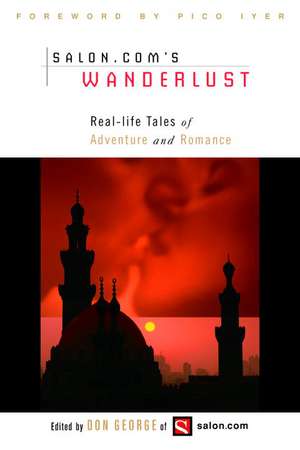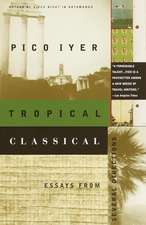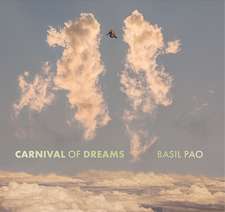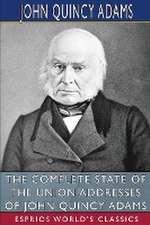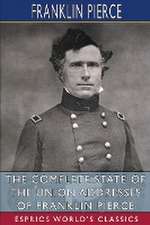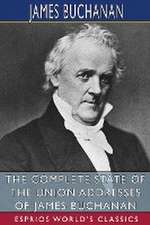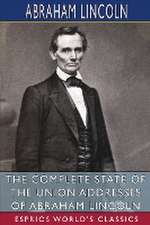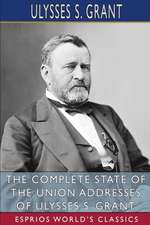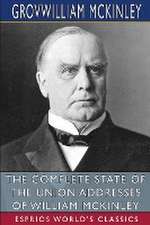Wanderlust: Real-Life Tales of Adventure and Romance
Pico Iyer Editat de Don Georgeen Limba Engleză Paperback – 31 oct 2000
Isabel Allende in the Amazon
Pico Iyer in Bali
Bill Barich in Italy
Sallie Tisdale in Japan
Carlos Fuentes in Zurich
Po Bronson in the Caribbean
and thirty-four more scintillating and sizzling tales of serendipity and wanderlust.
Preț: 157.76 lei
Nou
Puncte Express: 237
Preț estimativ în valută:
30.19€ • 31.40$ • 24.92£
30.19€ • 31.40$ • 24.92£
Carte tipărită la comandă
Livrare economică 11-17 aprilie
Preluare comenzi: 021 569.72.76
Specificații
ISBN-13: 9780679783633
ISBN-10: 0679783636
Pagini: 384
Dimensiuni: 139 x 217 x 24 mm
Greutate: 0.49 kg
Editura: Villard Books
ISBN-10: 0679783636
Pagini: 384
Dimensiuni: 139 x 217 x 24 mm
Greutate: 0.49 kg
Editura: Villard Books
Notă biografică
Don George writes Salon.com's weekly travel column, "Wanderlust," and was the founder and editor of its award-winning travel site. Prior to joining Salon, he was travel editor at the San Francisco Examiner. He lives with his wife and two children in the San Francisco Bay Area.
Extras
Why We Travel, by Pico Iyer
"Travel is like love: It cracks you open, and so pushes you over all the walls and low horizons that habits and defensiveness set up."
The first time I ever met Don George (then the travel editor for a San Francisco newspaper, though "Wanderlust" was already his motto and his destination), we found ourselves talking just like that, and talking and talking and talking, about the ways in which love quickens a sense of vulnerability and so admits us to states of mind, or areas of knowledge, that we didn't know we had (to that extent travel always moves invisibly). Don in Greece and Paris, I in Thailand and Cuba, and both of us most poignantly and heart-shakingly in Japan, had come to relish the sensation of being spellbound outsiders, wide open to all the beauties of a place, and in a state of excitement for which the only words we could find were those associated with romance and passion. To travel is to trust again, and to believe anew in many of the deeper qualities that get mislaid on the office desk.
As the years went on, Don and I found ourselves crossing paths in all kinds of unlikely places, from Marin County, California, to Melbourne, Australia, from a waiting room in Los Angeles International Airport to a dining room beside the swan-filled gardens of the Bel Air Hotel. And whenever we did, our conversation (with a life of its own, it seemed) would pull us back to what really sent us: the trips that made the soul fly. All the journeys we most deeply cherished and remembered were the ones that threw into question—or rotation—our notions of home and abroad, and reminded us that home is fundamentally something portable that we carry around inside us (and find when we feel an affinity).
"Wanderlust" is in that respect a misnomer: The "lust" part has more to do with surrender than with conquest, and is closer to what I would call gusto; and the "wander" has little to do with crossing borders and getting stamps in one's passport, and everything to do with stretching the boundaries of one's perspective and being drawn constantly to challenge. The person susceptible to "wanderlust" is not so much addicted to movement as committed to transformation.
One day I decided to try to summarize some of the conversations Don and I had had, and to formulate why exactly it is that some of us are moved to travel. The essay that follows is, therefore, like all our conversations, both a collaboration and an exploration.
Nara, Japan
February 2000
We travel, initially, to lose ourselves; and we travel, next, to find ourselves. We travel to open our hearts and eyes and learn more about the world than our newspapers will accommodate. We travel to bring what little we can, in our ignorance and knowledge, to those parts of the globe whose riches are differently dispersed. And we travel, in essence, to become young fools again—to slow time down and be taken in, and fall in love once more. The beauty of this whole process was best described, perhaps, before people even took to frequent flying, by George Santayana in his lapidary essay "The Philosophy of Travel." We "need sometimes," the Harvard philosopher wrote, "to escape into open solitudes, into aimlessness, into the moral holiday of running some pure hazard, in order to sharpen the edge of life, to taste hardship, and to be compelled to work desperately for a moment at no matter what."
I like that stress on work, since never more than on the road are we shown how proportional our blessings are to the difficulty that precedes them; and I like the stress on a holiday that's "moral," since we fall into our ethical habits as easily as into our beds at night. Few of us ever forget the connection between "travel" and "travail," and I know that I travel in large part in search of hardship—both my own, which I want to feel, and others', which I need to see. Travel in that sense guides us toward a better balance of wisdom and compassion—of seeing the world clearly, and yet feeling it truly. For seeing without feeling can obviously be uncaring; while feeling without seeing can be blind.
Yet for me the first great joy of traveling is simply the luxury of leaving all my beliefs and certainties at home, and seeing everything I thought I knew in a different light, and from a crooked angle. In that regard, even a Kentucky Fried Chicken outlet (in Beijing) or a scratchy revival showing of Wild Orchid (on the Champs-Elysées) can be both novelty and revelation: In China, after all, people will pay a whole week's wages to eat with Colonel Sanders, and in Paris, Mickey Rourke is regarded as the greatest actor since Jerry Lewis. If a Mongolian restaurant seems exotic to us in Evanston, Illinois, it only follows that a McDonald's would seem equally exotic in Ulan Bator—or, at least, equally far from everything expected.
Though it's fashionable nowadays to draw a distinction between the "tourist" and the "traveler," perhaps the real distinction lies between those who leave their assumptions at home, and those who don't. Among those who don't, a tourist is just someone who complains, "Nothing here is the way it is at home," while a traveler is one who grumbles, "Everything here is the same as it is in Cairo"—or Cuzco or Kathmandu. It's all very much the same.
But for the rest of us, the sovereign freedom of traveling comes from the fact that it whirls you around and turns you upside down, and stands everything you took for granted on its head. If a diploma can famously be a passport (to a journey through hard realism), a passport can be a diploma (for a crash course in cultural relativism). And the first lesson we learn on the road, whether we like it or not, is how provisional and provincial are the things we imagine to be universal. When you go to North Korea, for example, you really do feel as if you've landed on a different planet—and the North Koreans doubtless feel that they're being visited by an extraterrestrial, too (or else they simply assume that, like them, you receive orders every morning from the Central Committee on what clothes to wear and what route to use when walking to work, and that, like them, you have loudspeakers in your bedroom broadcasting propaganda every morning at dawn, and that, like them, you have your radios fixed so as to receive only a single channel).
We travel, then, in part just to shake up our complacencies by seeing all the moral and political urgencies, the life-and-death dilemmas, that we seldom have to face at home. And we travel to fill in the gaps left by tomorrow's headlines: When you drive down the streets of Port-au-Prince, for example, where there is almost no paving and women relieve themselves next to mountains of trash, your notions of the Internet and a "one world order" are usefully revised. Travel is the best way we have of rescuing the humanity of places, and saving them from abstraction and ideology.
In the process, we are saved from abstraction ourselves, and come to see how much we can bring to the places we visit, and how much we can become carrier pigeons—an anti-Federal Express, if you like—in transporting back and forth what every culture needs. I find that I always take Michael Jordan posters to Kyoto, and bring woven ikebana baskets back to California; I invariably travel to Cuba with a suitcase piled high with bottles of Tylenol and bars of soap, and come back with one piled high with salsa tapes, and hopes, and letters to long-lost brothers.
"Travel is like love: It cracks you open, and so pushes you over all the walls and low horizons that habits and defensiveness set up."
The first time I ever met Don George (then the travel editor for a San Francisco newspaper, though "Wanderlust" was already his motto and his destination), we found ourselves talking just like that, and talking and talking and talking, about the ways in which love quickens a sense of vulnerability and so admits us to states of mind, or areas of knowledge, that we didn't know we had (to that extent travel always moves invisibly). Don in Greece and Paris, I in Thailand and Cuba, and both of us most poignantly and heart-shakingly in Japan, had come to relish the sensation of being spellbound outsiders, wide open to all the beauties of a place, and in a state of excitement for which the only words we could find were those associated with romance and passion. To travel is to trust again, and to believe anew in many of the deeper qualities that get mislaid on the office desk.
As the years went on, Don and I found ourselves crossing paths in all kinds of unlikely places, from Marin County, California, to Melbourne, Australia, from a waiting room in Los Angeles International Airport to a dining room beside the swan-filled gardens of the Bel Air Hotel. And whenever we did, our conversation (with a life of its own, it seemed) would pull us back to what really sent us: the trips that made the soul fly. All the journeys we most deeply cherished and remembered were the ones that threw into question—or rotation—our notions of home and abroad, and reminded us that home is fundamentally something portable that we carry around inside us (and find when we feel an affinity).
"Wanderlust" is in that respect a misnomer: The "lust" part has more to do with surrender than with conquest, and is closer to what I would call gusto; and the "wander" has little to do with crossing borders and getting stamps in one's passport, and everything to do with stretching the boundaries of one's perspective and being drawn constantly to challenge. The person susceptible to "wanderlust" is not so much addicted to movement as committed to transformation.
One day I decided to try to summarize some of the conversations Don and I had had, and to formulate why exactly it is that some of us are moved to travel. The essay that follows is, therefore, like all our conversations, both a collaboration and an exploration.
Nara, Japan
February 2000
We travel, initially, to lose ourselves; and we travel, next, to find ourselves. We travel to open our hearts and eyes and learn more about the world than our newspapers will accommodate. We travel to bring what little we can, in our ignorance and knowledge, to those parts of the globe whose riches are differently dispersed. And we travel, in essence, to become young fools again—to slow time down and be taken in, and fall in love once more. The beauty of this whole process was best described, perhaps, before people even took to frequent flying, by George Santayana in his lapidary essay "The Philosophy of Travel." We "need sometimes," the Harvard philosopher wrote, "to escape into open solitudes, into aimlessness, into the moral holiday of running some pure hazard, in order to sharpen the edge of life, to taste hardship, and to be compelled to work desperately for a moment at no matter what."
I like that stress on work, since never more than on the road are we shown how proportional our blessings are to the difficulty that precedes them; and I like the stress on a holiday that's "moral," since we fall into our ethical habits as easily as into our beds at night. Few of us ever forget the connection between "travel" and "travail," and I know that I travel in large part in search of hardship—both my own, which I want to feel, and others', which I need to see. Travel in that sense guides us toward a better balance of wisdom and compassion—of seeing the world clearly, and yet feeling it truly. For seeing without feeling can obviously be uncaring; while feeling without seeing can be blind.
Yet for me the first great joy of traveling is simply the luxury of leaving all my beliefs and certainties at home, and seeing everything I thought I knew in a different light, and from a crooked angle. In that regard, even a Kentucky Fried Chicken outlet (in Beijing) or a scratchy revival showing of Wild Orchid (on the Champs-Elysées) can be both novelty and revelation: In China, after all, people will pay a whole week's wages to eat with Colonel Sanders, and in Paris, Mickey Rourke is regarded as the greatest actor since Jerry Lewis. If a Mongolian restaurant seems exotic to us in Evanston, Illinois, it only follows that a McDonald's would seem equally exotic in Ulan Bator—or, at least, equally far from everything expected.
Though it's fashionable nowadays to draw a distinction between the "tourist" and the "traveler," perhaps the real distinction lies between those who leave their assumptions at home, and those who don't. Among those who don't, a tourist is just someone who complains, "Nothing here is the way it is at home," while a traveler is one who grumbles, "Everything here is the same as it is in Cairo"—or Cuzco or Kathmandu. It's all very much the same.
But for the rest of us, the sovereign freedom of traveling comes from the fact that it whirls you around and turns you upside down, and stands everything you took for granted on its head. If a diploma can famously be a passport (to a journey through hard realism), a passport can be a diploma (for a crash course in cultural relativism). And the first lesson we learn on the road, whether we like it or not, is how provisional and provincial are the things we imagine to be universal. When you go to North Korea, for example, you really do feel as if you've landed on a different planet—and the North Koreans doubtless feel that they're being visited by an extraterrestrial, too (or else they simply assume that, like them, you receive orders every morning from the Central Committee on what clothes to wear and what route to use when walking to work, and that, like them, you have loudspeakers in your bedroom broadcasting propaganda every morning at dawn, and that, like them, you have your radios fixed so as to receive only a single channel).
We travel, then, in part just to shake up our complacencies by seeing all the moral and political urgencies, the life-and-death dilemmas, that we seldom have to face at home. And we travel to fill in the gaps left by tomorrow's headlines: When you drive down the streets of Port-au-Prince, for example, where there is almost no paving and women relieve themselves next to mountains of trash, your notions of the Internet and a "one world order" are usefully revised. Travel is the best way we have of rescuing the humanity of places, and saving them from abstraction and ideology.
In the process, we are saved from abstraction ourselves, and come to see how much we can bring to the places we visit, and how much we can become carrier pigeons—an anti-Federal Express, if you like—in transporting back and forth what every culture needs. I find that I always take Michael Jordan posters to Kyoto, and bring woven ikebana baskets back to California; I invariably travel to Cuba with a suitcase piled high with bottles of Tylenol and bars of soap, and come back with one piled high with salsa tapes, and hopes, and letters to long-lost brothers.
Descriere
These 40 selections of award-winning travel tales and unpublished essays featured on the travel Web site take readers around the world--to a mouthwatering Memphis barbecue contest, a furious bartering session in Istanbul for a kilim rug, and a dizzying evening of drink in Barcelona.
